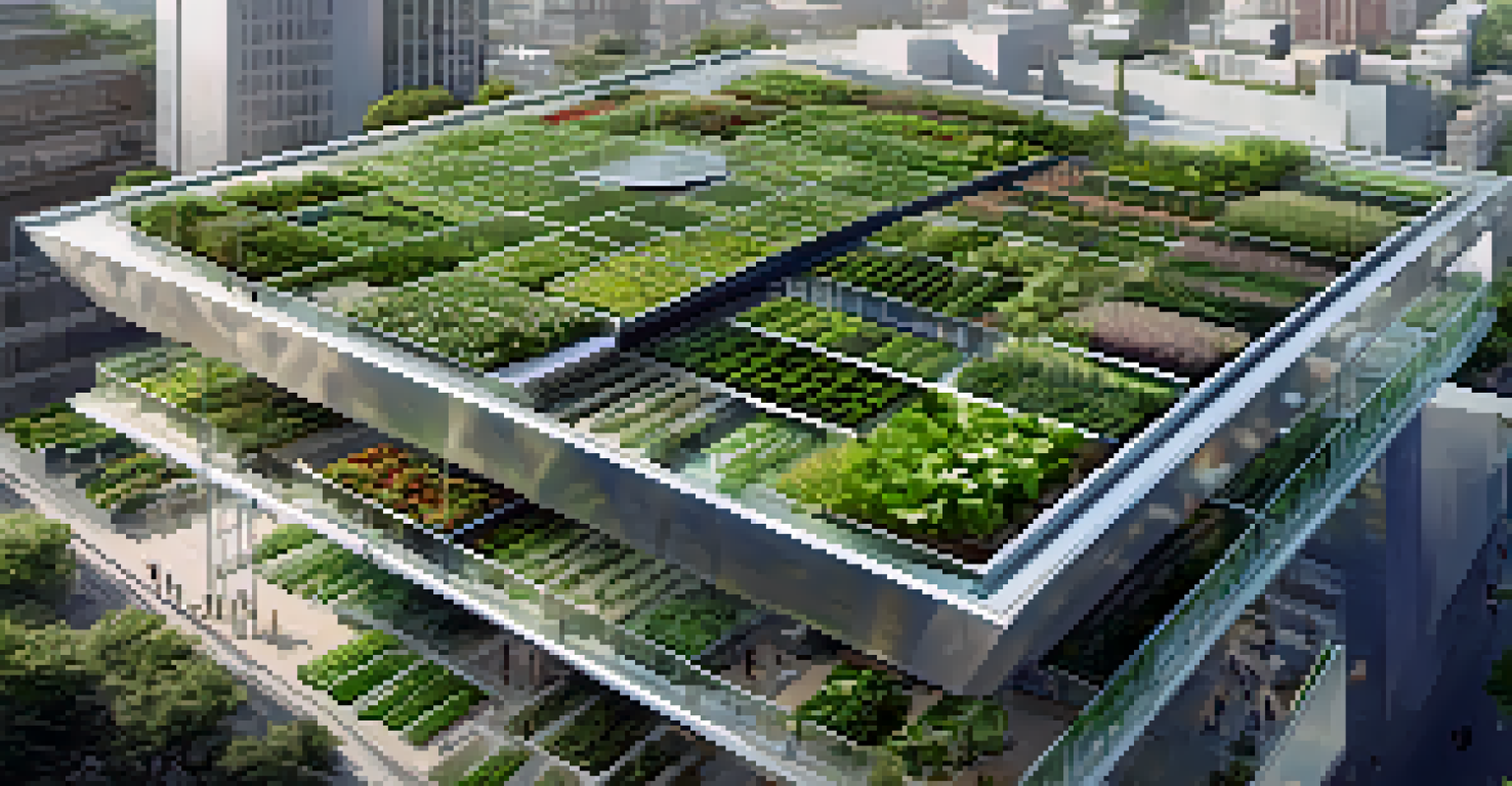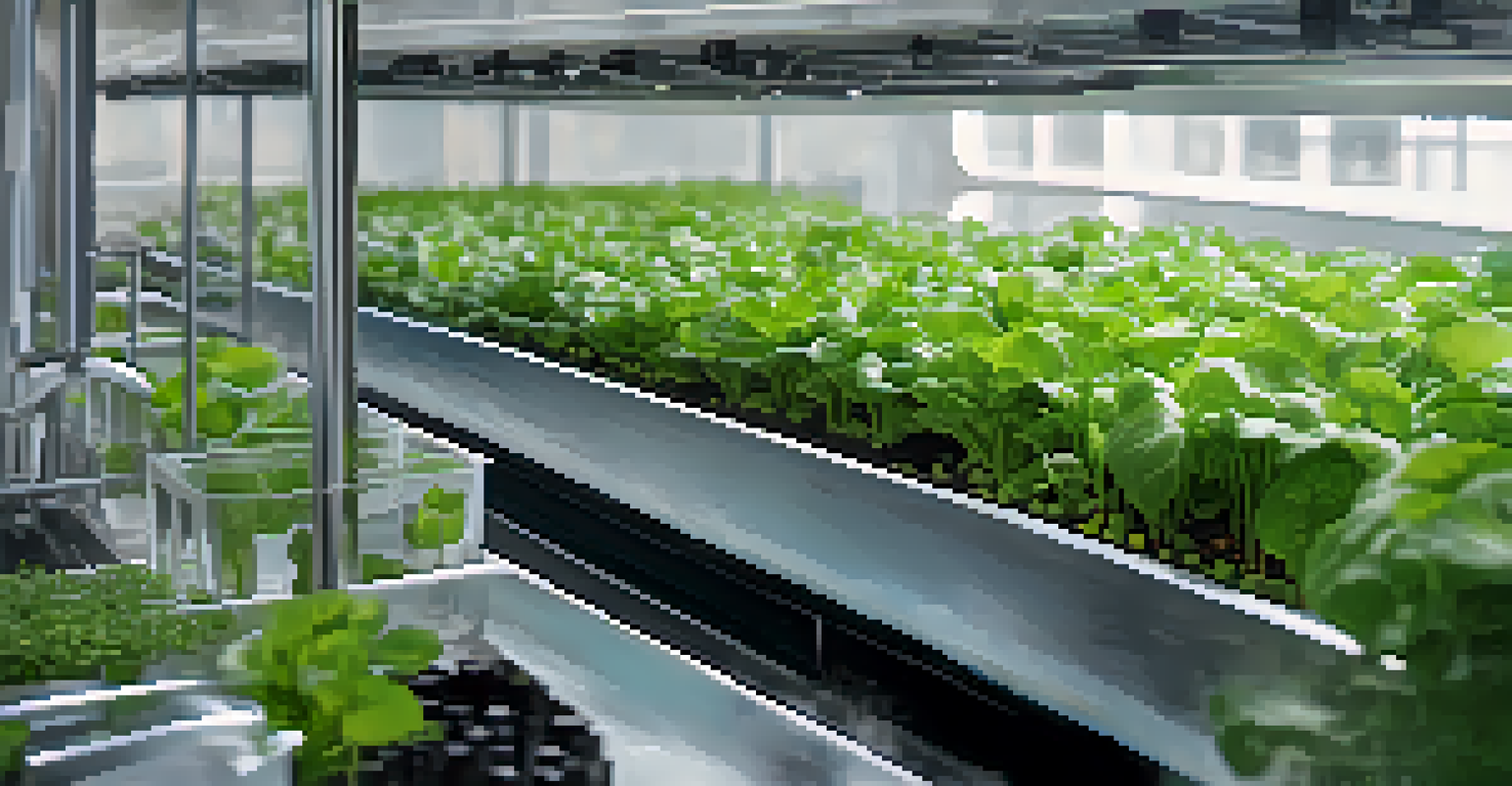Urban Agriculture: A Solution to Hawaii's Economic Challenges

Understanding Urban Agriculture and Its Importance
Urban agriculture refers to the practice of cultivating, processing, and distributing food within urban areas. It plays a crucial role in enhancing food security, especially in places like Hawaii, where food is often imported. By growing food locally, communities can reduce dependency on external sources and bolster their resilience against economic challenges.
Urban agriculture is a means to achieve food sovereignty and ensure the health of our communities.
In Hawaii, where the cost of living is significantly high, urban agriculture offers a way for families to supplement their diets and reduce grocery bills. Additionally, it fosters a sense of community by bringing residents together to share resources, knowledge, and produce. This collaborative spirit can be a powerful tool in addressing the economic disparities faced by many communities in the islands.
Moreover, urban agriculture contributes to environmental sustainability by promoting practices such as composting and organic farming. These methods help to reduce waste and lower carbon footprints, making them an appealing option for eco-conscious residents. In a place as beautiful as Hawaii, preserving the environment while boosting the local economy is a win-win situation.
The Economic Benefits of Urban Farming in Hawaii
Urban farming can significantly impact Hawaii's economy by creating job opportunities and stimulating local businesses. From farmers' markets to community-supported agriculture (CSA) programs, these initiatives not only provide fresh produce but also foster local entrepreneurship. This can lead to a more robust local economy that is less reliant on external factors.

Additionally, urban agriculture can enhance tourism, as visitors are increasingly interested in sustainable practices and local food experiences. Farms that offer tours, workshops, or farm-to-table dining can attract tourists while educating them about local agriculture. This not only generates revenue but also encourages the preservation of agricultural traditions in Hawaii.
Boosting Local Economy Through Farming
Urban agriculture can create jobs and stimulate local businesses in Hawaii, promoting a more self-sufficient economy.
Furthermore, by investing in urban agriculture, Hawaii can cultivate a new generation of farmers and agricultural professionals. Educational programs that teach sustainable farming techniques can inspire young people to pursue careers in agriculture. This shift can ultimately lead to a more stable and self-sufficient economy.
Challenges Facing Urban Agriculture in Hawaii
Despite its potential, urban agriculture in Hawaii faces several challenges. Limited land availability in urban areas can hinder the expansion of farming initiatives. High property costs and zoning regulations can also pose barriers to starting and maintaining urban farms, making it crucial for policymakers to address these issues.
When we grow food in our communities, we not only nourish our bodies but also strengthen our ties to one another.
Additionally, the unique geography and climate of Hawaii present specific challenges for urban farming. From invasive species to unpredictable weather patterns, farmers must navigate various obstacles to ensure successful crop production. This necessitates ongoing education and support for urban farmers to adapt and thrive in this environment.
Finally, there is a need for increased community awareness and support for urban agriculture. Many residents may not fully understand the benefits of local food systems or how to get involved. By promoting education and outreach initiatives, Hawaii can cultivate a stronger connection between urban agriculture and its communities.
Community Engagement: A Key to Success
Community engagement is essential for the success of urban agriculture in Hawaii. When residents come together to support local farming initiatives, they create a network of resources and knowledge that can lead to greater success. Community gardens, for instance, can serve as a hub for education and collaboration, fostering a sense of ownership and pride among participants.
Moreover, local schools can play a pivotal role in promoting urban agriculture. Incorporating gardening programs into the curriculum not only teaches students about healthy eating but also instills a sense of responsibility towards food production. By nurturing a new generation of environmentally conscious individuals, Hawaii can secure a sustainable future for its agricultural practices.
Community Engagement Drives Success
Active community involvement in urban agriculture fosters collaboration and strengthens local food systems.
Additionally, community-supported agriculture (CSA) programs can enhance engagement by allowing residents to invest directly in local farms. By purchasing shares in a farm's harvest, community members can enjoy fresh produce while supporting local farmers financially. This model strengthens the bond between producers and consumers, ultimately benefiting the local economy.
Innovative Solutions for Urban Farming
Innovation plays a crucial role in overcoming the challenges faced by urban agriculture in Hawaii. Vertical farming, for example, allows for efficient use of limited space while maximizing crop yield. By utilizing technology and advanced growing techniques, urban farmers can produce fresh food in compact environments, making it an appealing option for cities with space constraints.
Hydroponics and aquaponics are also gaining popularity as sustainable farming methods. These systems rely on nutrient-rich water and fish waste to nourish plants, eliminating the need for soil. This not only conserves water but also allows for year-round crop production, providing a steady supply of fresh produce regardless of the season.
Moreover, embracing technology such as mobile apps to connect consumers with local farmers can improve accessibility and streamline the purchasing process. By making it easier for residents to find and buy local produce, these innovations can help strengthen the urban agriculture movement in Hawaii.
Policy Support for Urban Agriculture Initiatives
Supportive policies are essential for the growth and sustainability of urban agriculture in Hawaii. Local governments can play a significant role by providing resources, grants, and incentives for urban farming initiatives. By prioritizing policies that promote land access and sustainable practices, they can create an enabling environment for urban agriculture.
Additionally, zoning regulations should be revisited to facilitate the establishment of urban farms and community gardens. Streamlining processes for permits and approvals can encourage more residents to engage in urban farming. This can lead to increased food production and greater community resilience in the face of economic challenges.
Innovative Solutions for Urban Challenges
Adopting innovative farming techniques like vertical farming and hydroponics can help overcome space limitations in urban areas.
Finally, collaboration between government agencies, non-profits, and local farmers can create a comprehensive support system for urban agriculture. By pooling resources and expertise, these stakeholders can work together to address challenges and promote best practices. This unified approach can ensure the long-term success of urban agriculture in Hawaii.
The Future of Urban Agriculture in Hawaii
Looking ahead, the future of urban agriculture in Hawaii is filled with potential. As communities become more aware of the benefits of local food systems, there is likely to be an increase in support for urban farming initiatives. This growing interest can lead to the establishment of more community gardens, urban farms, and educational programs focused on sustainable practices.
Furthermore, as technology continues to advance, urban agriculture will become even more efficient and accessible. Innovations in growing techniques, distribution methods, and consumer engagement can create a thriving ecosystem that supports local farmers and meets the community's needs. This evolution can help to build a resilient food system that benefits everyone.

Ultimately, by embracing urban agriculture, Hawaii has the opportunity to transform its economic landscape. With strong community support and effective policies, urban farming can become a cornerstone of a sustainable and prosperous future, ensuring that residents have access to fresh, local food while fostering economic growth.